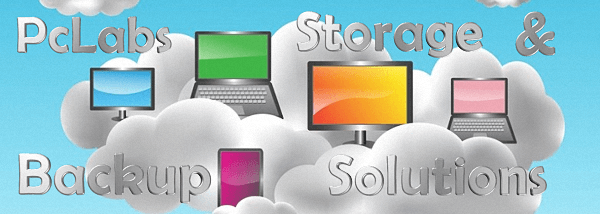
Our Backups are Tailored to Your Specific Needs
 We at Pclabs carefully tailor backup procedures to your specific business needs, personal habits, your teams' workflows, legal requirements mandating archival and backup storage of data, and your need to preserve most or only certain files.
We at Pclabs carefully tailor backup procedures to your specific business needs, personal habits, your teams' workflows, legal requirements mandating archival and backup storage of data, and your need to preserve most or only certain files.
Not surprisingly, the optimum topology, hardware and software architecture, schedules and scripts for backing up a small office, medium-size office, large office, a data center or an individual proprietor are all very different, as no two businesses, or any two people are much alike. Backup procedures vary from office to office and differ from person to person, to reflect individual and unique storage and backup needs.
Why Storage Should be Implemented by an Expert IT Pro
 As a reasonable person, you probably would not waste your time on creating cryptographic algorithms, unless you are a mathematician specializing in cryptography (which is still no guarantee of success).
As a reasonable person, you probably would not waste your time on creating cryptographic algorithms, unless you are a mathematician specializing in cryptography (which is still no guarantee of success).
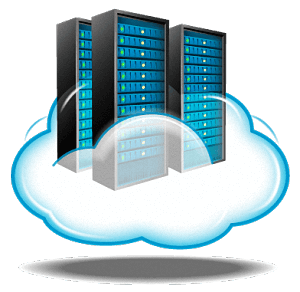 If you did, your amateurish cryptography would fail miserably when facing today's sophisticated multi-tier hacking. Equally, unless you limit your backups to saving a few photographic memories, it is best to leave the creation of your network topology, storage architecture, handling of data, digital security and backup procedures to IT professionals with a lifetime of experience in this discipline. There are just too many places where you'd fail to effectively protect your data.
If you did, your amateurish cryptography would fail miserably when facing today's sophisticated multi-tier hacking. Equally, unless you limit your backups to saving a few photographic memories, it is best to leave the creation of your network topology, storage architecture, handling of data, digital security and backup procedures to IT professionals with a lifetime of experience in this discipline. There are just too many places where you'd fail to effectively protect your data.
It is just too easy to end up with a false sense of security by covering some, but not all exposures. A simple example: Special care must be taken in handling data by medical offices, law offices, accounting offices, etc. to protect client’s confidentiality. Embarrassing mishaps, like Bill O'Reilly's legal team e-mailing by mistake their strategy to the opposing council (unencrypted, of course) are way too common, and much too costly.
Strong data and communications encryption is what would prevent data theft and unauthorized access to your private data by the third parties, such as data provider's personnel, for example.
 Suffice it to say that there's a plethora of password "recovery" (password cracking) technology available for security auditing and recovery of lost data, which break many types of weak protection wide open. On the other hand, if all you really want to save are a few photographs of people who do not care about their privacy, a simple “cloud storage” arrangement might do.
Suffice it to say that there's a plethora of password "recovery" (password cracking) technology available for security auditing and recovery of lost data, which break many types of weak protection wide open. On the other hand, if all you really want to save are a few photographs of people who do not care about their privacy, a simple “cloud storage” arrangement might do.
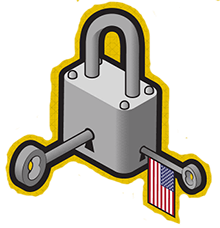 Encryption of the off-site-stored data is a must in most cases, and of certain documents — in many cases. But not all cryptography was created equal: some is "strong", some is so weak, it can be broken in minutes by a simple computer utility, and even “military grade” encryption has built-in backdoors. As the governments put pressure on software vendors to provide backdoors for the law enforcement agencies, most of the US software vendors obliged. Unfortunately, sooner or later these loopholes are leaked “into the wild” – become known to hackers, not just those employed by governments, but also to industrial spies, your competitors, hackers who are seeking personal enrichments or glamor and accolades of other hackers and anarchysts.
Encryption of the off-site-stored data is a must in most cases, and of certain documents — in many cases. But not all cryptography was created equal: some is "strong", some is so weak, it can be broken in minutes by a simple computer utility, and even “military grade” encryption has built-in backdoors. As the governments put pressure on software vendors to provide backdoors for the law enforcement agencies, most of the US software vendors obliged. Unfortunately, sooner or later these loopholes are leaked “into the wild” – become known to hackers, not just those employed by governments, but also to industrial spies, your competitors, hackers who are seeking personal enrichments or glamor and accolades of other hackers and anarchysts.
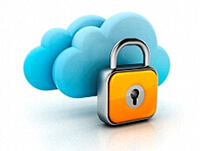 The choice is yours: Do your own research, or rely on our vast professional experience in communications and data security to give you encryption and cryptographic protocols that cannot be broken. Why prptocols are important? — Hackers do not use frontal attack on a strong encryption algorythm. Instead, they attack the weak links in the chain of cutody of data, where it is unencrypted. The upshot is that real protection takes a thorough understanding of data custody workflows, topology and security protocols.
The choice is yours: Do your own research, or rely on our vast professional experience in communications and data security to give you encryption and cryptographic protocols that cannot be broken. Why prptocols are important? — Hackers do not use frontal attack on a strong encryption algorythm. Instead, they attack the weak links in the chain of cutody of data, where it is unencrypted. The upshot is that real protection takes a thorough understanding of data custody workflows, topology and security protocols.
All Clouds Are Not Created Equal
In a public cloud service, you pay a service provider for some limited amount of storage, 10GB for example, which you use to back up some of your files over the Internet and share this "cloud storage" between your devices. But just as you get comfortable with it, the service is subject to periodically announced further size limitations and hikes in service fees. Publicly offered cloud-based storage is great — until it goes out of business, becomes “no longer offered” or drastically changes the deal by hiking up the fees. This may come after you’ve spent years uploading gigabytes of precious data.
 In essence cloud services rent you space: you pay for their disk space in monthly fees, but you also pay the hidden price of losing control over your personal files, which they mine for information about your online shopping, habits, interests, tastes and preferences, and sell this metadata to companies marketing products to you. But that wouldn't be so bad... except they have complete access to your data, which you may naively assume they would always treat as your data, proprietary and confidential.
In essence cloud services rent you space: you pay for their disk space in monthly fees, but you also pay the hidden price of losing control over your personal files, which they mine for information about your online shopping, habits, interests, tastes and preferences, and sell this metadata to companies marketing products to you. But that wouldn't be so bad... except they have complete access to your data, which you may naively assume they would always treat as your data, proprietary and confidential.
Just for this reason alone, instead of relying on a cloud service, say from Microsoft or Google, it makes sense to establish a personal cloud, which offers many advantages over the cloud services offerings. Even when your backup and file sharing needs are quite modest (the simplest variety of cloud-based backup) you will save money over time if you run an elegant “personal cloud” backup arrangement, which we can recommend, install and fully automate.
Note that hundreds of text-books have been published on the subject of backups, but our brief website format only allows us to simply highlight some of their important features.
Benefits of a Personal Cloud
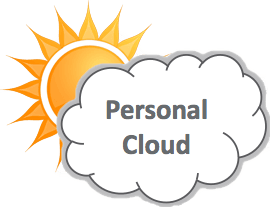
You, and Nobody Else Have Access to Your Data
With a personal cloud, your personal files are stored in your home, in your office, or in any room you physically control. Nobody but you can access your files, mine data, spy on your habits and preferences, steal or do anything nefarious with your files. Your data, your storage device, and your "cloud" device are all in your castle. You’re the only one with the keys to your castle. And you can safely access all your files, from anywhere in the world, as if you are at home.
Encryption of Data
Files on the hard drive are (should be) encrypted using military-grade protocol used by banks.
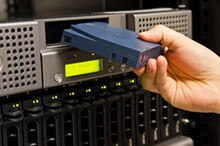 If someone steals your hard drive in the office, or when you keep some backups offsite, the would-be data thief won’t be able to read any of your files.
If someone steals your hard drive in the office, or when you keep some backups offsite, the would-be data thief won’t be able to read any of your files.
Encryption of communications
As you may know, RF, WiFi, mobile and just about any communications are easily intercepted and broken into... unless encrypted. All exchanges between your devices and personal cloud storage are encrypted using keys that only your devices have. Your authenticated devices are the only ones in the world able to decipher and access your files. This end-to-end, multi-factor encryption renders WiFi eavesdropping and any kind of eavesdropping and wiretapping uselss, so rest assured your data traverses the hostile environment of the Internet securely.
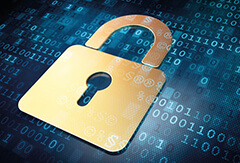 Even if hackers were to succeed in stealing your password, these would-be thieves will not gain access to your data in this multi-factor authentication environment, where the actual "passphrase" exchange is one-time only and cannot be recycled. The weak point, of course, is if the attackers gained physical access to your device and installed a sophisticated keylogger. But if this is a concern, and you require even stronger security, we can deploy biometrics (finger prints, facial recognition, your unique retitna image) to ensure that only you have access to your devices and your data. The upshot is that only you and nobody else and no one else’s devices can access your data. And all of this security is made transparent to you... same price as public cloud, or better.
Even if hackers were to succeed in stealing your password, these would-be thieves will not gain access to your data in this multi-factor authentication environment, where the actual "passphrase" exchange is one-time only and cannot be recycled. The weak point, of course, is if the attackers gained physical access to your device and installed a sophisticated keylogger. But if this is a concern, and you require even stronger security, we can deploy biometrics (finger prints, facial recognition, your unique retitna image) to ensure that only you have access to your devices and your data. The upshot is that only you and nobody else and no one else’s devices can access your data. And all of this security is made transparent to you... same price as public cloud, or better.
Have Access to Your Unlimited Storage from Anywhere in the World.. even on the Phone.
With a private cloud, your telephone with a puny 16GB memory gets access to ALL of your files on the Cloud Storage device, with no memory size limitation, even if your office stores all the books in the Library of Congress on its server. Depending on your needs, we can install in your home location a personal cloud hard disk with say, 1TB, 2TB, 4TB or practically any size disk you may need.

The Force (your private cloud) Is Always With You...
You (or you and your team members throughout the world) have access to all of this storage from anywhere in the world where there is Internet service, such as wired Internet, WiFi network or mobile 3G, 4G networks. All you need is any of your paired devices, be it a tiny smart phone, notepad, a laptop, or a desktop computer. In other words, you have access to all of your home office data, regardless of how large its aggregate size, not only when you are at your desk, but from anywhere in the world, on any of your authenticated devices.
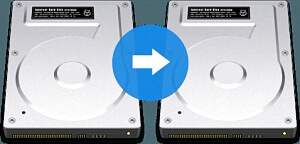
 Whether you need to salvage the contents of a disk, which became unbootable, transfer data from malfunctioning disk to a new one, transfer data from an old computer to a new one as image (everything) or just the user environment (programs and data) to another computer with a new operating system, transfer data between disks of different sizes, PcLabs provides expert help. Be aware that these tasks are non-trivial and an amateurish execution may result in a massive loss of data.
Whether you need to salvage the contents of a disk, which became unbootable, transfer data from malfunctioning disk to a new one, transfer data from an old computer to a new one as image (everything) or just the user environment (programs and data) to another computer with a new operating system, transfer data between disks of different sizes, PcLabs provides expert help. Be aware that these tasks are non-trivial and an amateurish execution may result in a massive loss of data.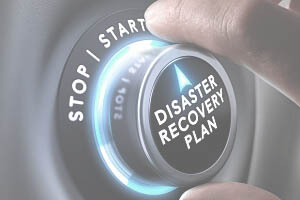
 Doctors, lawyers, accountants and numerous other professionals and small businesses cannot exist without some form of archival system, not even to mention larger offices and industries like banks, brokerages and insurers.
Doctors, lawyers, accountants and numerous other professionals and small businesses cannot exist without some form of archival system, not even to mention larger offices and industries like banks, brokerages and insurers.